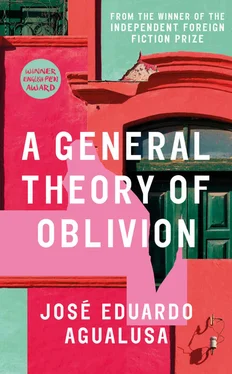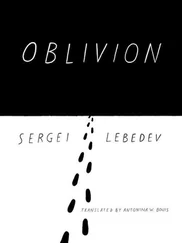She knew, even before opening her eyes, that the storm was moving off. The sky was clearing. A ray of sunlight warmed her face. From up on the terrace she heard a whine, a weak complaint. Phantom, stretched out at her feet, leapt up, ran across the apartment to the living room, ran up the spiral staircase, tripping over himself, and disappeared. Ludo raced after him. The dog had cornered the monkey against the banana tree, and he was growling, nervous, head down. Ludo grabbed him by the collar, firmly, pulling him towards her. The German Shepherd resisted. He made as if to bite her. The woman smacked him on the nose with her left hand, again and again. Finally, Phantom gave in. He let himself be dragged away. She tied him up in the kitchen, shut the door and returned to the terrace. Che Guevara was still there, watching her with light, wondering eyes. She had never even seen such an intensely human look in the eyes of any man. On his right leg she could see a gash that was deep and clean, that looked like it had been made just moments earlier by a machete blow. The blood was mixing with rainwater.
Ludo peeled a banana, which she had brought from the kitchen, and held her arm out. The monkey leaned forward, sticking out his muzzle. He shook his head, in a gesture that might have indicated pain, or distrust. The woman called sweetly to him:
‘Come on now, come on little one. Come, I’ll look after you.’
The animal approached, dragging his leg, crying sadly. Ludo let go of the banana and grabbed him by the neck. With her left hand she drew the knife she had at her waist and buried it in the lean flesh. Che Guevara gave a cry, broke free, the blade stuck in his belly, and with two big jumps he reached the wall. He stopped there, leaning against the wall, wailing, spattering blood. The woman sat down on the floor, exhausted. She, too, was crying. They stayed like that a long while, the two of them, looking at each other, until it started raining again. Then Ludo got up, walked over to the monkey, pulled out the knife and slit his throat.
In the morning, as she salted the meat, Ludo noticed that the rebel aerial was once again turned towards the south.
That aerial, and three others.
THE DAYS SLIDE BY AS IF THEY WERE LIQUID
The days slide by as if they were liquid. I have no more notebooks to write in. I have no more pens either. I write on the walls, with pieces of charcoal, brief lines.
I save on food, on water, on fire and on adjectives.
I think about Orlando. I hated him, at first. Then I began to see his appeal. He could be very seductive. One man and two women under the same roof — a dangerous combination.
I am oyster-sized
kept apart here with my pearls
.
.
.
shards in the abyss
THE SUBTLE ARCHITECTURE OF CHANCE
The man with the brilliant smile was called Bienvenue Ambrosio Fortunato. Not many people knew him by that name. At the end of the sixties he’d composed a bolero entitled ‘Papy Bolingô’. The song, which was performed by François Luambo Luanzo Makiadi, the great Franco, had been an immediate hit, played day and night on the radios of Kinshasa, and the young guitar player earned himself a nickname that would accompany him for the rest of his life. A little over twenty years old, persecuted by the regime of Joseph-Désiré Mobutu, a.k.a. Mobutu Sese Seko Kuku Ngbendu waza Banga, Papy Bolingô had sought exile in Paris. He first got work as a doorman at a nightclub, and later as a guitarist in a circus band. It was in France that he made contact with the small Angolan community and rediscovered the country of his ancestors. As soon as Angola became independent, he packed his bags and set off for Luanda. He performed at weddings and other private parties frequented by Angolans who had returned from Zaire, and by true Zaireans pining for their homeland. The daily bread, which was so hard to earn, he managed to get through his work as a sound technician at Rádio Nacional. He was on duty the morning of 27 May, when the rebels entered the building. He then witnessed the arrival of the Cuban soldiers, who quickly put the house in order with slaps and kicks, retaking control of the broadcast.
As he left, very disturbed by the events he had witnessed, he saw a military truck ploughing into a car. He ran over to save the occupants. He immediately recognised one of the wounded men, a chubby guy with short, strong arms, who had on one occasion questioned him at the radio station. Then he noticed the tall young man, gaunt as an Egyptian mummy, his wrists cuffed together. He didn’t hesitate. He helped the young man to his feet, covered his hands with his jacket, and brought him to his apartment.
‘Why did you help me?’
Little Chief asked this question over and over, countless times, during the four years he spent hidden in the sound technician’s apartment. His friend rarely answered. He gave a big laugh, the laugh of a free man, shook his head, changed the subject. One day he looked him straight in the eye:
‘My father was a priest. He was a good priest and an excellent father. To this day I don’t trust priests without children. How can you be a priest, if you aren’t a father? Mine taught us to help the weak. And that time, when I saw you sprawled out on the pavement, you sure looked pretty weak to me. Besides, I recognised one of policemen, a security officer, who had been at my work interrogating people. I don’t like the thought police. I never have. So I did what my conscience told me.’
Little Chief spent long months hidden away. After the death of the first president, the regime experimented with a hesitant opening-up. Those political prisoners not linked to the armed opposition were released. Some received invitations to occupy positions in the apparatus of the State. As he went out onto the streets of the capital, feeling somewhere between alarmed and intrigued, Little Chief discovered that almost everybody believed him dead. Some friends assured him they had actually been at his funeral. A few of his comrades in the struggle even seemed a little disappointed to be reunited with him quite so alive. As for Madalena, she received him joyfully. In the years that had passed she had set up an NGO, Stone Soup, committed to improving the diet of the communities living in Luanda’s slum housing. She would go through the poorest neighbourhoods of the city, teaching the mothers and feeding the children, as best she could with the limited resources available.
‘You can eat better without spending more,’ she explained to Little Chief. ‘You and your friends fill your mouths with big words — Social Justice, Freedom, Revolution — and meanwhile people waste away, they fall ill, many of them die. Speeches don’t feed people. What the people need are fresh vegetables, and a good fish broth at least once a week. I’m only interested in the kinds of revolution that start off by getting people sat at the table.’
The young man was enthused by this. He started accompanying the nurse, in exchange for a symbolic wage — three meals a day, a bed and laundry. In the meantime, the years went by. The socialist system was dismantled by the very same people who had set it up, and capitalism rose from the ashes, as fierce as ever. Guys who just months ago had been railing against bourgeois democracy, at family lunches and parties, at demonstrations, in newspaper articles, were now dressed in designer clothing, driving around the city in cars that gleamed.
Little Chief allowed a thick prophet’s beard to stretch down over his thin chest. He was still incredibly elegant and, despite the beard, retained a youthful look about him. However, he began to walk stooped slightly to the left, as though he were being pushed, from within, by a violent gale. One afternoon, seeing the rich people’s cars parading past, he remembered the diamonds. Following Papy Bolingô’s advice, he went over to the Roque Santeiro market. He was carrying a piece of paper with a name on it. He thought, as he allowed himself to be dragged along by the crowd, that it would be impossible to track anyone down in the vastness of that chaos. He was afraid he would never be able to get out. He was wrong. The first trader he approached pointed him in one particular direction. Another, a few metres on, confirmed it. After fifteen minutes he stopped outside a shack on whose door someone had painted, in rough strokes, the torso of a woman, with a long neck, lit up by a diamond necklace. He knocked. He was met by a slim man in a pink jacket and trousers and a livid-red tie and hat. His shoes, which were highly polished, shone in the gloom. Little Chief remembered the sapeurs Papy Bolingô had introduced him to, years earlier, on a short visit to Kinshasa. ‘ Sapeurs ’ are what they call the fashion-mad in the Congo. Guys who dress in clothes that are expensive and showy, spending everything they have, and some that they don’t have, to walk the streets like models on a catwalk.
Читать дальше












